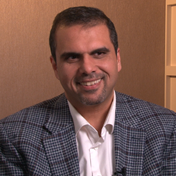Ahmed al-Awamer MD, MHSc

Dr. al-Awamer is an Assistant Professor in the Department of Family and Community Medicine at the University of Toronto. He is a staff palliative care physician and educator at the Supportive Care department, Princess Margaret Cancer Center in Toronto, Canada’s largest cancer center and one of the top five research cancer centers in the world. After completing his medical degree from King Faisal University, Saudi Arabia and palliative medicine residency training from the University of Toronto, Dr. al-Awamer obtained a Master of Health Science (MHSc) degree in bioethics from the University of Toronto. In his various roles, Dr. al-Awamer is the Co-Director for the Clinical Palliative Care Fellowship program at the Department of Medicine, University of Toronto. He is also the Education Lead in the division of palliative care at Princess Margaret Cancer Center, Canada’s largest cancer center and one of the top five cancer centers in the world. He has published and delivered conference papers nationally and internationally about palliative care and ethics. His research interest is in education, adolescents and young adults (AYA) palliative care, end-of-life Islamic ethics, and global palliative care promotion. Dr. al-Awamer co-founded the AYA integrated psychosocial and palliative care clinic at Princess Margret Cancer Center. This clinic is dedicated to providing age-appropriate supportive and palliative care for young adults with cancer and aims to raise awareness about AYA cancer patients needs through education and medical research. The AYA program attracts a large number of medical learners and researchers from different medical disciplines interested in learning about AYA patients.
“Most young adults with cancer endure a higher level of physical and emotional distress compared to other adults. Despite the proven benefits of palliative care, many young adults are reluctant to accept palliative care support which unfortunately results in unneeded suffering. The goal of palliative care is to improve the quality of life of cancer patients and helps with disease coping. In my experience, most patients who received palliative care support felt satisfied and report a better quality of life. While many clinicians caring for young cancer patients struggle with emotions triggered by patients’ suffering, I find working with young adults cancer patients to be extremely rewarding. Listening and building a trusting relationship are the keys to provide outstanding care for young cancer patients.”
Further Links or Information:
Twitter: @ahmed_al_awamer